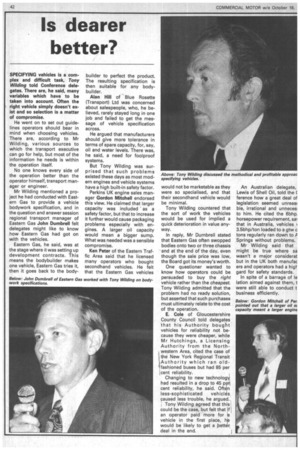Is dearer better?
Page 44

If you've noticed an error in this article please click here to report it so we can fix it.
SPECIFYING vehicles is a complex and difficult task, Tony Wilding told Conference delegates. There are, he said, many variables which have to be taken into account. Often the right vehicle simply doesn't exist and so selection is a matter of compromise.
He went on to set out guidelines operators should bear in mind when choosing vehicles. There are, according to Mr Wilding, various sources to which the transport executive can go for help, but most of the information he needs is within the operation itself.
No one knows every side of the operation better than the operator himself, transport manager or engineer.
Mr Wilding mentioned a project he had conducted with Eastern Gas to provide a vehicle bodywork specification, and in the question and answer session regional transport manager of Eastern Gas John Dumbrell felt delegates might like to know how Eastern Gas had got on with the vehicles.
Eastern Gas, he said, was at the stage where it was setting up development contracts. This means the bodybuilder makes one vehicle, Eastern Gas tries it, then it goes back to the body builder to perfect the product. The resulting specification is then suitable for any bodybuilder.
Alan Hill of Blue Rosette (Transport) Ltd was concerned about salespeople, who, he believed, rarely stayed long in one job and failed to get the message of vehicle specification across.
He argued that manufacturers should give more tolerance in terms of spare capacity, for, say, oil and water levels. There was, he said, a need for foolproof systems.
But Tony Wilding was surprised that such problems existed these days as most modern engines and vehicle systems have a high built-in safety factor.
Perkins UK engine sales manager Gordon Mitchell endorsed this view. He claimed that larger capacity was included as a safety factor, but that to increase it further would cause packaging problems especially with engines. A larger oil capacity would mean a bigger sump. What was needed was a sensible compromise.
Ken Peter of the Eastern Traffic Area said that he licensed many operators who bought secondhand vehicles. He felt that the Eastern Gas vehicles would not be marketable as they were so specialised, and that their secondhand vehicle would be minimal.
Tony Wilding countered that the sort of work the vehicles would be used for implied a quick deterioration in value anyway.
In reply, Mr Dumbrell stated that Eastern Gas often swopped bodies onto two or three chassis and at the end of the day, even though the sale price was low, the Board got its money's worth.
One questioner wanted to know how operators could be persuaded to buy the right vehicle rather than the cheapest. Tony Wilding admitted that the problem had no ready solution, but asserted that such purchases must ultimately relate to the cost of the operation.
E. Cole of Gloucestershire County Council told delegates that his Authority bought vehicles for reliability not because they were cheaper, while Mr Hutchings, a Licensing Authority from the Northwestern Area, cited the case of the New York Regional Transit Authority which ran old'I fashioned buses but had 85 per cent reliability.
Changing to new technology had resulted in a drop to 45 p?tt cent reliability, he said. Often less-sophisticated vehicles caused less trouble, he argued.
Tony Wilding agreed that this could be the case, but felt that if an operator paid more for la vehicle in the first place, hp would be likely to get a better, deal in the end. An Australian delegate, Lewis of Shell Oil, told the ( ference how a great deal of legislation seemed unreasi ble, irrational and unneces; to him. He cited the 6bhp, horsepower requirement, saN that in Australia, vehicles 1 3.5bhp/ton loaded to a gtw c tons regularly ran down to A Springs without problems.
Mr Wilding said that might be true where sa wasn't a major considerat but in the UK both manufac ers and operators had a higlgard for safety standards.
In spite of a barrage of le lation aimed against them, t were still able to conduct t business efficiently.




























































































































































































































































































